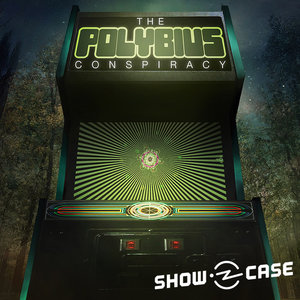This review will contain some vague spoilers. An entirely spoiler-free review would be next to impossible to write for this podcast, so this is the only review I will be writing for it. If you would like to experience Showcase by Radiotopia’s “The Polybius Conspiracy” with minimal spoilers, please listen to all seven episodes before reading.
An important update: As it turns out, much of this review may be moot; Slate recently reported that this show was largely fiction, which was never disclosed during the show and, if anything, was purposefully contradicted by the show. This, obviously, brings up a different debate. Given the apparently fictional quality of the show, I think it’s a fantastic listen–if you’re fine with a show that goes out of its way to manipulate its listeners to believe it is nonfiction.
When WBEZ’s podcast S-Town was released earlier in 2017, it garnered praise from the media for its literary stylings. In the show, stories like Faulkner’s “A Rose for Emily” were discussed in the context of the show’s setting, and the show itself has been called “aural literature.” After the initial glut of positive reviews, though, many were left looking at this piece of audio, wondering if making a very true story into something that felt fictional was acceptable. It left listeners wondering if the art being created justified the voyeuristic nature of it production.
The same can be said for any second-person nonfiction narrative, of course. Asif Kapadia’s Amy (2015) won an Oscar, but many criticized the way it told the story of singer Amy Winehouse and her death. Even small-scale documentaries, like James Swirsky and Lisanne Pajot’s Indie Game: The Movie (2012) has a central storyline that focuses on the unraveling of a game developer’s mental health.
So, naturally, the same could be said of Showcase by Radiotopia‘s “The Polybius Conspiracy.”

“The Polybius Conspiracy” follows producers Jon Frechette and Todd Luoto as they try to research the mysteries Polybius, an arcade-style video game that may or may not have existed in the early 1980s, specifically in Portland. The game has become a part of online folklore a la Slenderman or the BEN Drowned story. As the producers start speaking with Portland local Bobby Feldstein, a man who claims to have been abducted as a child for playing Polybius, it starts feeling much less like folklore and more like an actual conspiracy.
The first six episodes of the show’s seven are a riveting dive into Feldstein’s narrative and the ever-growing cast of characters. Frechette and, to a lesser degree, Luoto do serve as characters themselves, the constant skeptics to Feldstein’s story. “Rubin” is the show’s last main character, so to speak, a recovering addict looking for his missing partner, “Marc,” who he suspects is wrapped up in the dark dealings of Polybius. Each episode builds on the suspense and tension of the last, heightening the stakes and deepening the mystery.
When heard through the lens of an actual unveiling of a government conspiracy, the show feels a natural fit to the current science fiction pop culture: it has the government agency mystery and 80’s nostalgia of Stranger Things, the pull of a riveting and heartbreaking LGBT+ love story, and the struggle to prove the validity and truth of a past trauma. This reading, of course, brings up issues: if Feldstein is the protagonist, this would make the producers who constantly try to dismiss him the antagonists, and Feldstein’s struggle becomes one against both those who don’t believe him and the podcast’s own production. Somehow, this still often feels like the direction the show leads the listener. While the producers constantly bring up their caution in believing Feldstein, they also bring up the uncanny nature of the coincidences in his story. Even the bed music seems to heighten when more of Feldstein’s claims line up. When Frechette asks Feldstein’s ex girlfriend, “Was Bobby a fun date?”, a leading question that seems like an easy jab at Feldstein, the producers’ role as an antagonist feels more solidified, a cartoonish writing of a manipulative journalist–and the instance is anything but isolated. By the end of the seventh episode, neither Feldstein nor Rubin will answer the producers’ calls. Frechette remarks upon the moment Rubin stops talking to them with ignorance as to why, saying:
That was the last time Rubin would speak to us. Whatever he had once believed about Marc–that he disappeared in search of a Polybius cabinet, that he’d relapsed–none of that seemed to matter now, only that somehow, co-producer Todd Luoto and I had manipulated him.
Listening through the lens of a biographic look into a man whose identity has been formed around a lie he told when he was young, though, quickly becomes an even more disquieting experience. Here, there are no protagonists, no antagonists–there are just two producers trying to tell the story of what might be a government conspiracy, but what might also be a manipulative story woven by a mentally ill man who so wholly believed a story from his own memory that wasn’t true. This podcast was not released as the story was unfolding. The podcast was released after the audio had all been recorded, produced, and edited. The producers knew the story they were telling and how it would end. If the listener is to believe that Feldstein is a liar, a manipulator, someone who is mentally ill, a drug dealer, then what is the podcast saying? With this reading, the initial suspense and excitement feels like yet another voyeuristic, fantastical narrative shoved onto an aggressively unwilling subject. With this reading, the show itself feels manipulative, capitalizing off a mentally ill man, a man whose infidelity caused his partner to leave him, and that partner’s relapse.
The latter is the more sensible reading, obviously. While listening to the first six episodes, I Googled things like “is The Polybius Conspiracy an audio drama” or “is The Polybious Conspiracy fiction” during each episode at least once, which is not hyperbole; so many details of the show seem to good to be true, and ultimately, they are. Frechette’s narration in the seventh episode flirts with the validity of the former reading, but only “if [the listener] want to indulge in conspiracy theories.” By the end of the seventh episode, the listener is left with the knowledge that really, what they listened to was a sad true account of various sad people. The listener, like the producers, have been swept up into Feldstein’s story, hoping it was true, and of course it isn’t. Even Feldstein himself seems to doubt his story in the show’s end. This is all mused on by Frechette towards the end of the final episode:
We had reached the final level, and much like young Bobby learned in 1981, the game’s most crucial challenge wasn’t controlling a starship or clearing boards, but mastering how to navigate a new world while engulfed in darkness, somehow preserving one’s agency in the face of overwhelming uncertainty, where all that remains are your convictions.
To recommend “The Polybius Conspiracy” is to recommend a story that is extremely enjoyable when indulging in the suspense and excitement of a found footage horror film. If the listener distances themselves by adding an almost subconscious veneer of fiction over the story, it becomes some of the best horror one can find in podcasting–and the horror genre in podcasting is not scarce. To recommend “The Polybius Conspiracy,” though, is also to recommend a story about real people with real lives. This is the nature of documentary and nonfiction. The point is not the people, but the story, and at the podcast’s end, the story is a riveting one. “The Polybius Conspiracy” is, probably, not one in which actual lives were lost as in S-Town, but the uncomfortable voyeuristic quality still remains. The podcast, like Polybius, or like Bobby Feldstein, or like Marc, or like the producers, eventually feels far outside the scope of itself for better or for worse.
I imagine I will return to this podcast many times, and that each time, I will come away feeling different degrees of enlightened and uneasy. Maybe this was the purpose the producers set out to achieve. There’s a chance this podcast was always meant to reflect society’s infatuation with sensationalized news, or how so many trust emotion over logic, or how people will do anything to form details into a compelling story. Maybe, though, the podcast always meant to tell the story at its core, the story of an urban legend, and wound up telling the story of two radio producers who put aside empathy for the sake of telling a story.
Almost definitely, though, the podcast is both. Whether this makes the show successful or not in its execution may always feel as mysterious as the story itself.
You can find Showcase by Radiotopia and its miniseries “The Polybius Conspiracy” on any major podcast streaming platform or on the series’s website.








Leave a comment